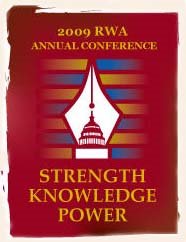 One amazing workshop I attended was A Look Inside the Editor’s Mind. As a writer, I’m always trying to figure out what’s going on in an editor’s mind so the title was irresistible.
One amazing workshop I attended was A Look Inside the Editor’s Mind. As a writer, I’m always trying to figure out what’s going on in an editor’s mind so the title was irresistible.
The description: Harlequin Editor-at-Large Leslie Wainger will cold-read up to 25 synopses and analyze their strengths, weaknesses, chances of being requested, and more.
That sounded pretty fascinating, especially considering the fact that I find writing a synopsis roughly equivalent to walking over hot coals barefoot. I figured I could use all the help I can get.
It was a master class in synopsis writing like no other I’ve ever attended (and I’ve been to quite a few). Ms. Wainger started reading at the top of her synopsis pile. As she read, she commented on what she liked, what didn’t work, what could be stronger, what should be left out and whether she would read more. The audience sat spellbound and groaned in frustration when the moderator called, “Time’s up!” I think we all could have sat there for at least another hour because we truly felt we were getting to watch the inner workings of an editor’s brain as she evaluates a story. Also Ms. Wainger happens to be very funny and engaging so the time just flew by.
Here are my notes. I’m afraid they are a very minimalist summary of what I truly learned from Ms. Wainger. I was too busy listening to jot down long sentences so this is a boiled-down version without any of the vivid illustrations we got from the workshop. I strongly recommend listening to the audio recording of this presentation.
1. Do not waste time in a synopsis. However, do fill in the blanks.
2. Editors don’t like coincidences or plotlines that feel contrived.
3. A one or two sentence encapsulation of the book right at the beginning of the synopsis can work well. Just make sure it’s clear that the synopsis begins in the next paragraph.
4. Stick to the heroine/hero conflict and plot. Minor characters should be kept to a minimum, if included at all. Keep proper names to a minimum.
5. Starting with a dilemma, often in the form of a question, can work well.
6. Get the romance in! WHY are they in love?
7. She requested a maximum of two pages, single-spaced, in a synopsis.
8. You need to show the tension in both plot and romance.
9. You need to feel the characters are driving the action, not vice versa.
10. Suspense has to be logical, i.e. no coincidences, etc.
11. You want to make sure you get the characters’ emotions across.
12. In contemporaries, try not to put in any references which will date them. Contemps should be in “the eternal present”.
13. It’s all about the characters!
Do I need to add that I came home and immediately revised my synopsis?

Thanks, Nancy. I printed this out for future reference.
Pat, I hope it’s helpful to you when it comes time to write the “dreaded” synopsis. 🙂
I was there too and found it very insightful. One other tidbit I took away is don’t spend a lot of synopsis space on description of setting, people, etc.
It was, as you noted, a workshop full of good information and insight.
I wasn’t able to go to this workshop but I did buy the recordings. I can’t wait to get it so I can look at all the workshops I wasn’t able to attend!
Nancy,
Thanks for this information. Because Harlequin in my target, it’s helpful to hear what they expect since I wasn’t able to attend the conference. I, too, have printed it.
Looking forward to your future RWA reports.
Anne, thanks for adding to my list! That’s a great point about keeping descriptive info to a minimum. Leslie was so funny and so right when she read a description of the heroine and said, “That doesn’t matter because for me, the heroine will always be a middle-aged, red-headed woman with glasses.” Leslie claimed that was an accurate description of herself, but she was correct in saying that we as readers put ourselves in the place of the heroine. That’s why romance is so much fun.
I’m so glad to hear folks are finding this write-up helpful!
Nancy,
LOVING your recaps from National! I went to see if the conference tapes are up (not yet, darn it!), because I want to listen to Leslie’s workshop ASAP. Like you, I find writing a synopsis akin to torture. While they can help in the long run – i.e., seeing the sagging middle before you get there – they’re tough for my pantster heart to even get started on.
THANKS!
Jen 🙂